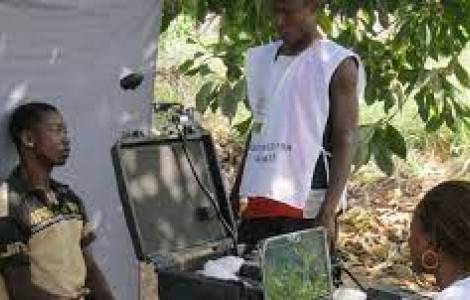AFRICA/SIERRA LEONE – The country goes to the polls. Father Peter Konteh (Caritas): there will also be Catholics in the next government
UN News
Freetown (Agenzia Fides) – Sierra Leone is preparing for a new round of elections. The country, ravaged by an atrocious decade-long conflict (1991-2002) between the rebels of the Revolutionary United Front supported by special forces (NPFL), and government troops, which left 50,000 dead, has for two decades started a difficult, but constant path towards democratization and stability and will go to the polls on June 24 for the fifth time since the end of the war. After ending a brutal conflict that sadly brought to light the phenomenon of child soldiers, widely exploited by the opposing forces, this small West African country has long enjoyed relative peace and can boast progress in various fields (for example, one of its ministers, David Moinina Sengeh, 36, received the prize for the best minister in the world at the World Government Summit in Dubai last February, ed), even though 56% of its population is below the poverty line. The election period is generally a source of strong tension. It is no coincidence that President Julius Maada Bio of the Sierra Leone People’s Party (SLPP), one of the 13 candidates vying for the supreme office, called on the people during his last meeting in the capital, Freetown, on Tuesday, June 20, to remain calm and foster a relaxed atmosphere at the end of a highly conflictual election campaign. “No violence! You have your card, go and vote that day, but in peace”, said Maada Bio.
“We lived through a terrible war – explains to Fides Father Peter Konteh, executive director of Caritas Freetown – which devastated the country and made the population suffer (8.5 million, ed). Church community has always tried to promote reconciliation and detente, but each time we get closer to the elections, tribal problems are revived, violence between different factions and episodes of hate speech increase on the networks social and media. Unfortunately, these events occur regularly during the election campaign and in the period leading up to the vote. Then things usually calm down. We hope that once again the climate will gradually calm down after June 24”. This year, precisely for fear of clashes as in previous elections, traditional political demonstrations in the streets have been banned and ocean gatherings have been smaller than usual. This, however, did not stop supporters of the main opposition party, the All People’s Congress (APC), from gathering in the capital Freetown to protest against the serious economic situation in the country. In recent months, Sierra Leone, which has one of the weakest currencies in the world, has seen inflation soar to over 43% and has one of the highest youth unemployment rates in West Africa. In August 2022, the security forces, in order to suppress demonstrations in Freetown, Makeni and Kamakwie, entered into direct confrontation with the demonstrators: the toll was six police officers and more than 20 demonstrators and bystanders killed. In recent months – Father Peter continues – “You could say that the climate has been relatively peaceful. The streets are rather calm and the police are watching the streets. But there have been several calls for an uprising or a strike and the fear of clashes has always remained high. It is no coincidence that the police presence is still massive in the streets of cities, especially in Freetown. The clashes of a few months ago left many dead. The problem is usually that politicians who win elections tend to find a solution with their supporters, and the fear of others about losing their jobs or old tribal and ethnic issues make everything more complicated. Unfortunately – Father Peter adds – the economic and social situation is very problematic and the conflict in Ukraine has exacerbated a situation which already had many sensitive points. This has inevitably increased the level of tension in Sierra Leonean society”. According to the executive director of Caritas Feeetown, “there are factors external to our country that are making us pay a high price. It may seem that the government is doing the wrong thing, but in reality it is external factors” . When the war began to wane in the late 1990s, it became clear to political leaders that there was a need to foster reconciliation in a community divided by bitter fighting and plagued by heavy casualties. In 1999, the Truth and Reconciliation Commission was created as part of the Lomé Peace Accord, signed on July 7, 1999, which began to end the civil war. The agreement was signed by then President Ahmad Tejan Kabbah and the leader of the Revolutionary United Front (RUF) Foday Sankoh. Since the beginning of the new century, many steps forward have been made. “I think there has been a lot of progress, and now we can say that our society is becoming more peaceful. If you compare the times of the war to today, things have changed a lot. There have been recovery programs, for example for child soldiers, in which the church community also played a leading role, and despite many problems, the country is now relatively peaceful. The Catholic community (Catholics are 25%, and Christians overall represent 40% of the population, ed) is a recognized and appreciated component of society. Schools and health works are areas in which the Church is very present and Muslims respect us a lot. The President is Catholic, as are the Foreign Minister, the Chief of Police and the Army. 75% of the members of the current government are Catholic, as are most of the leaders of the opposition. Therefore, whatever the outcome of the elections, there will also be Catholics in the next government”. (LA) (Agenzia Fides, 23/6/2023)
Share:
Source link : https://www.fides.org/en/news/73925-AFRICA_SIERRA_LEONE_The_country_goes_to_the_polls_Father_Peter_Konteh_Caritas_there_will_also_be_Catholics_in_the_next_government
Author :
Publish date : 2023-06-23 07:00:00
Copyright for syndicated content belongs to the linked Source.





